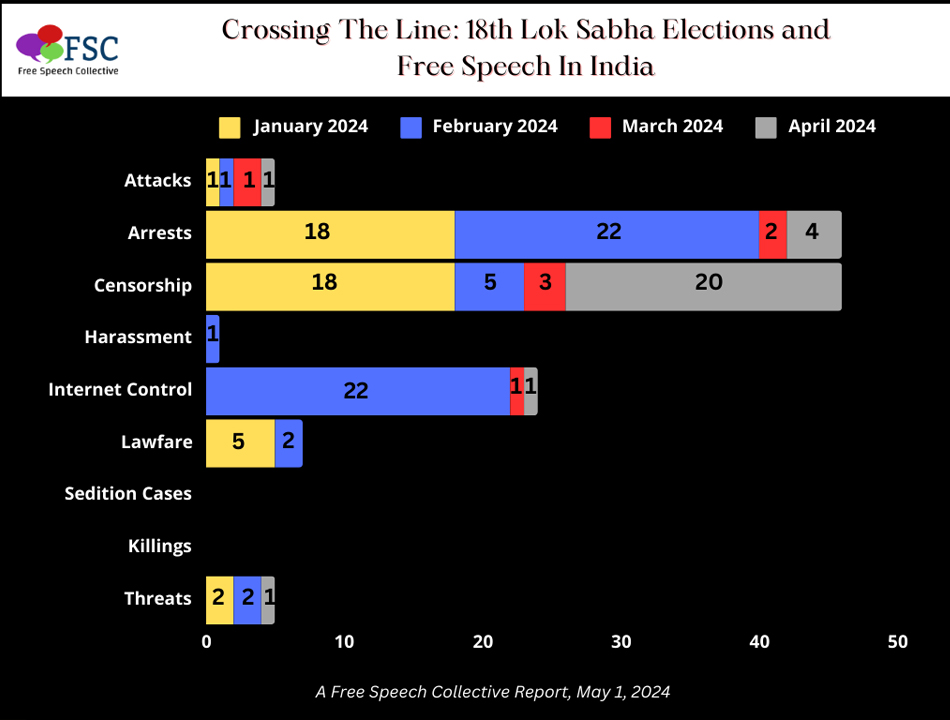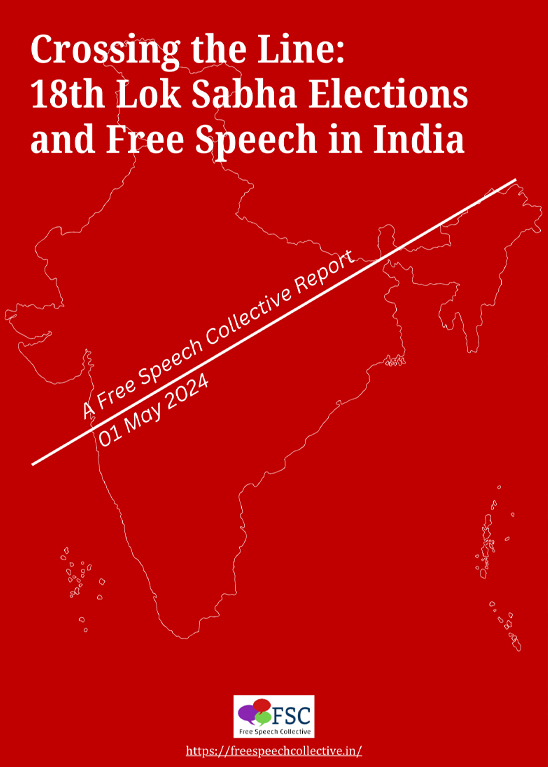“Free speech in India has sunk into a perilous abyss and steadily falling press freedom indices underscore the dangers of crossing a line that is becoming increasingly contentious.”
Groundxero | May 1, 2024
A report by Free Speech Collective released on May 1, 2024, reveals that from January 2024 onward, in the run up to the 2024 general election, there have been at least 134 instances of free speech violations in India.
The report says that the crackdown on free speech has been across the board with journalists, academics, YouTubers, students and other citizens having to face arrests, attacks, threats, harassment and censorship, marked by arbitrary enforcement of rules and laws.
“With false narratives, deliberate disinformation and hate speech dominating the electoral agenda, the space for verified information, the voicing of dissent or even raising serious debate has all but disappeared,” pointed out the report.
The report cited how Avani Dias, the South Asia bureau chief of Australian Broadcasting Corporation, was forced to pack her bags and leave India on April 22, 2024, three days after the first phase of the election began, because she was told her reporting had “crossed a line”.
Earlier, French journalist and freelance correspondent working in India since 2001, Vanessa Dougnac was also forced to leave the country, after being informed by the Ministry of Home Affairs that her Overseas Citizen of India (OCI) card will be revoked within two weeks. The OCI card allowed her to live and work in India for more than two decades. The revocation notice listed various grounds for the revocation of her OCI card including, “malicious” reporting that created a “ negative perception” of India and “inciting disorder”.
Anne Bocandé, editorial director of Reporters Without Borders (RSF), condemning the methods used by the Indian authorities to make Vanessa leave, in a statement said “Forcing a seasoned professional journalist to leave India after she had been based there for two decades reveals a very dark and deplorable image of what press freedom has become under Prime Minister Narendra Modi. With two months to go to general elections, the vice is tightening on foreign correspondents who try to cover India in a professional manner. We condemn the unacceptable way Vanessa Dougnac has been treated and the use of absurd accusations as a subterfuge to gag and intimidate outspoken reporters. The Indian authorities must guarantee journalists’ safety and freedom to work.”
The report pointed out that five journalists were arrested since the beginning of this year; while three — Dhanabir Maibam of Manipur, Santu Pan in West Bengal and Ashutosh Negi in Uttarakhand — were granted bail, the other two continue to be in custody. The report collated incidents since January in which at least 34 journalists were among the 46 citizens attacked across the country, including senior Marathi editor Nikhil Wagle, who was chased on February 9, 2024 by a murderous mob when he was on his way to a public meeting in Pune, accompanied by advocate Asim Sarode and activist Vishwambhar Choudhary. A day earlier, in a separate incident in Haldwani in Uttarakhand, ten journalists were attacked by a violent mob while one of them, photojournalist Sanjay Kanera, sustained grievous injuries and escaped with his life. According to reports, the mob burnt down the bikes of 14 journalists.
Kashmir journalist Aasif Sultan, in custody since 2018, was re-arrested under the Unlawful Activities Prevention Act (UAPA) four days after being granted bail in earlier cases. Apart from Aasif, six journalists — Gautam Navlakha (since April 2020), Sajad GUl (January 2022), Rupesh Kumar Singh (July 2022), Irfan Mehraj (March 2023), Majid Hyderi ( September 2023), and Prabir Purkayastha (October 2023) — continue to be in custody.
The report by the Free Speech Collective has registered 46 instances of censorship spanning social media, news media, academia and the field of entertainment across India. In January, the government invoked provisions of the Information Technology Act, and blocked websites like Hindutva Watch and India Hate Lab that track hate speech. During the farmers’ protest, earlier this year, in Haryana, at least 177 social media accounts and web links were blocked, on February 14 and 19 at the request of the Ministry of Home Affairs under section 69A of the IT Act. This period also recorded the highest number of internet shutdowns.
Not only journalists, websites, and social media accounts, in academic spaces, censorship has also become the norm. The report cites 24 instances of censorship in academia in just the first four months of the year. For example, UK based academic Nitasha Kaul was deported from Bengaluru airport, despite an invitation from the Karnataka state government to attend a conference on the Indian Constitution. Another case in point is the recent targeting of a school Principal in Mumbai for her tweets that ‘liked’ support for Palestine!
Earlier, there were attacks on gatherings of students and citizens who organised film screenings of the documentary ‘Ram ke Naam’ on the occasion of the consecration of the Ram temple in Ayodhya in January. The screening of the documentary was cited as one of the reasons for the two-year suspension and debarring of Ph.D scholar Ramadas KS, from all campuses of the Tata Institute of Social Sciences (TISS) on April 18. Earlier, the general secretary of the Progressive Students Forum (PSF), Ramadas was punished for ostensibly “anti national” activities, such as participating in a protest march against the Central government’s education policies in January 2024.
Furthermore, the prestigious social science institute TISS, issued a circular that a range of activities including “protest, screening, online viewing, seminars, workshops, meetings affiliated to politicians or in solidarity with any public figure, etc., will be strictly prohibited within campus till the conclusion of election.”
The TISS censorship story was one of the four instances of censorship at TISS and one of the 46 instances of censorship recorded in the period under review by the Free Speech Collective. With the hotting up of election coverage, the first casualties were Marathi news channel ‘Lokshahi Marathi’, Caravan news magazine and the popular Hindi YouTube video channel Bolta Hindustan.
On February 13, 2024, Caravan magazine received an order issued by the Ministry of Information and Broadcasting (MIB) ordering a takedown of their article ‘Screams from the Army Post: The Indian Army’s torture and murder of civilians in a restive Jammu’ within 24 hours. The magazine has challenged the order.
On April 4, 2024, the Hindi new channel Bolta Hindustan founder editor Haseen Rehmani, learnt of a notice blocking the channel issued by the MIB via an email from YouTube. The notice was ‘confidential’ and there was no reason ascribed for the blocking.
At around the same time, National Dastak, another popular Hindi YouTube news channel that was devoted to covering issues of marginalised sections of society, also got a notice for blocking its channel.
Earlier, the MIB had notified the Press Information Bureau (PIB) for the controversial fact check unit which had been challenged in the Bombay High Court and went to the Supreme Court after a split verdict. However, the apex court stayed the notification stating that serious constitutional questions were raised by petitioners who had challenged the notification.
Again, it was left to the Supreme Court to provide some relief for Javed Ahmed Hajam, a Kashmiri professor working in Sanjay Ghodawat College in Kolhapur district of Maharashtra, who was charged under Sec 153-A for his critical post on the abrogation of Art 370 in a WhatsApp group. In March, a bench led by Justice Abhay Oka said that his post was an expression of his individual view and at best, a protest, which is a part of his freedom of speech and expression guaranteed by Article 19(1)(a).
The report notes that while partisan sections of dominant media openly echo a dangerously divisive agenda with impunity, independent media faces punitive action and struggles to be heard. While the report did not track hate crimes, in the ongoing election campaigns, hate speech, especially from ‘star’ campaigners like Prime Minister Narendra Modi has invited no action from the Election Commission of India, despite widespread public condemnation and the filing of complaints.
“Free speech in India has sunk into a perilous abyss and steadily falling press freedom indices underscore the dangers of crossing a line that is becoming increasingly contentious,” pointed out the report.
The full version of the report, which lists the various instances, can be downloaded here.
Link to the website: https://freespeechcollective.in/.



